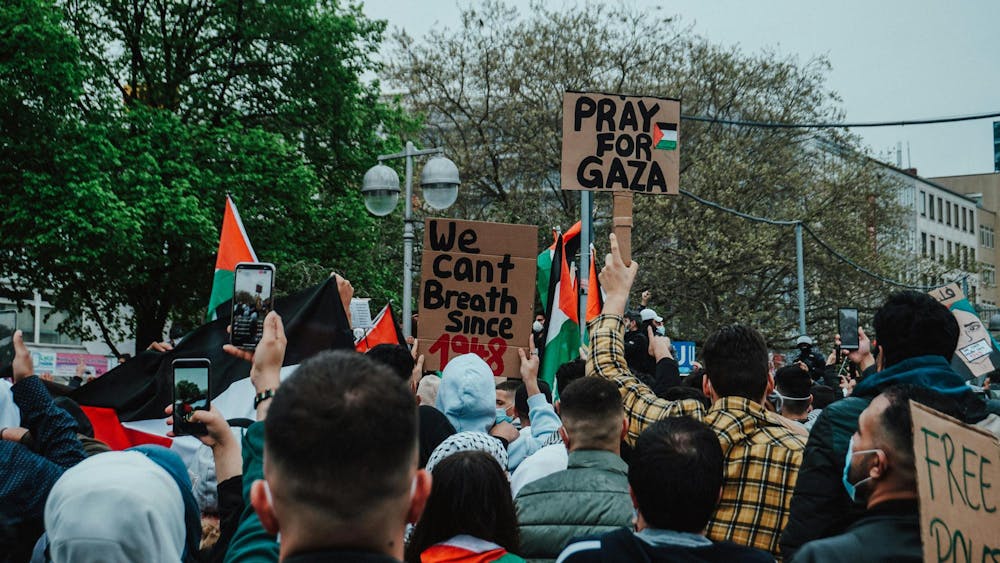Last semester, a group of around 40 Notre Dame students gathered on God Quad to stand in solidarity with Palestinians. It was raining; we mulled around quietly, hoping for good news from a small group who were meeting with the administration, pleading the case that we are morally obligated to divest from the ongoing genocide. Provost John McGreevy and former Dean Scott Appleby were dismissive of us and after a mere 15 minutes, walked away. The police encircled us five minutes later and arrested 17 students, throwing two to the ground — one even chipped a tooth. I was among the arrested.
And what were we charged with? Trespassing. On our own campus. We are students and teaching assistants and instructors, and we were arrested as trespassers. Earlier in the day, the police came and tore down our small canopy — the same you would see at any common tailgate. And although permits are only required for tents greater than 10 x 20 sq. ft, we were explicitly told by the police we were not allowed to put them up again. Throughout the course of the evening, we never defaced property, nor did we ever make hateful remarks. We didn’t even start chanting until the police gathered around us. It was clear that the issue wasn't tents or chants. It was what they pointed to — a growing student movement for justice in Palestine.
It didn’t have to be this way. Many universities did not make even a single arrest despite prolonged encampments. Students at Cornell University erected an encampment for 18 days and, in response, Cornell’s administration negotiated and listened to them. Taking it a step further was San Francisco State University who agreed to divest from weapons manufacturers after students maintained an encampment for two weeks. And other schools, like Michigan State University, responded similarly.
And even for those universities that did arrest students, many have already dropped the charges primarily due to lack of probable cause. Students have a right to gather on their own campus, after all. Columbia University, where the largest student encampment occurred, dropped the charges back in June. Other universities like Dartmouth, Indiana University, Arizona State University and Stony Brook University have followed a similar pattern, potentially implying that the arrests were a pretext for dispersing the crowds. Meanwhile, at the University of Virginia, their campus policy previously stated that tents did not require a permit. Yet, the administration redacted that statement hours before arresting 27 students. Later, the charges were dropped given the underhanded way the policy had been changed.
Whether dropping charges later or refusing to arrest students in the first place, these approaches contrast sharply with that of Notre Dame. Currently, all 17 arrested students are facing up to a year in prison and have waited for months for the charges to be dropped, to no avail. We have had to find lawyers and communal support as the University has made it clear where they stand — against free speech and against students who disagree with them. Our University has chosen to criminalize dissent rather than promote discourse. This treatment of anti-war students at Notre Dame betrays the basic tenets of Catholic Social Teaching of solidarity that this institution claims to uphold. Our University fails to meet the moral task even with the lowest bar imaginable; when a Catholic mother and daughter, Nahida and Samar Anton, were murdered in Gaza, Notre Dame remained silent.
So, where do we go from here? This summer, Notre Dame welcomed new leadership, with President Dowd emphasizing the need for respectful dialogue. It’s an additional step, but it’s not enough. The 17 students arrested that night have so much more to offer this campus without the weight of unjust charges hanging over our heads. We have continued to nurture constructive conversations by participating in guest lectures, writing academic articles and hosting communal campus events. If Notre Dame truly believes in the power of respectful dialogue, the first step is meeting each other where we are — at the same table, with open hearts. This is how we begin to move forward, together.
Seham S. Kafafi
Sept. 23
Occupation Free ND










